Chickens are typically raised for two purposes: For meat or to lay eggs that can then be sold. If you are planning on raising chickens for eggs, it is essential to know how many eggs a chicken will lay.
How many eggs will a chicken lay? Chickens can lay up to six eggs a week and around 250 eggs a year in their prime. They take 24-26 hours to produce an egg. The amount of eggs a chicken produces depends on its age, breed, time of year, the environment the chicken has access to, and its diet.
This article explores everything you need to know about chickens’ egg production rates and the factors which impact egg production.
Chicken’s Egg Production
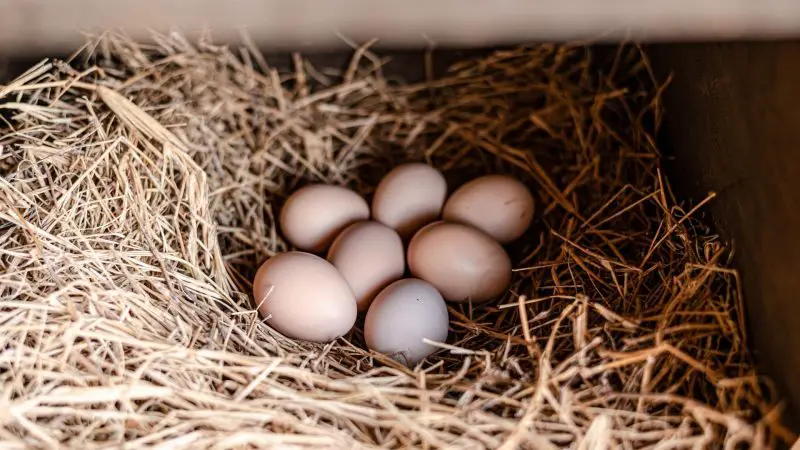
This section considers how many eggs a chicken can lay in a day, a week, and a year. Chickens can lay up to six eggs a week and almost 250 eggs a year. In a lifetime, some chickens may produce up to 800 eggs.
How Many Eggs Does a Chicken Lay a Day?
Different breeds of chickens have different egg-laying capacities and different types of eggs. Chickens may lay either table eggs, which are unfertilized and for consumption, or hatching eggs that are fertilized.
Chickens that lay table eggs produce 0.81 eggs a day, while chickens that lay hatching produce 0.61 eggs daily. At a maximum production rate, some chickens can lay an egg every 24 hours.
How Many Eggs Does a Chicken Lay in a Week?
When a chicken is young (up to two years old), on average, it may lay up to six eggs a week. As it gets older, its laying capacity reduces. By the time it is seven years old, a chicken may only lay one to two eggs a week.
How Many Eggs Does a Chicken Lay a Year?
Each year, a chicken can lay up to 250 eggs. A chicken can lay an egg every 24 to 26 hours, meaning it should be able to lay an egg nearly every day of the week. However, its production rate will likely decrease in winter.
This is because every year, chickens will molt, where they shed their old feathers and produce new ones. Most chickens will stop laying eggs when they are molting to conserve their nutrients to grow new feathers. So, for two to three months a year, chickens will stop laying eggs.
How Many Eggs Does a Chicken Lay in a Lifetime?
In its lifetime, a chicken may lay up to 800 eggs. However, the precise number of eggs a chicken lays in its lifetime depends on the breed of chicken and the conditions in which it’s kept.
In the best conditions, a chicken may lay an average of six eggs a week for two to three years. However, as the chicken gets older, the amount of eggs it lays reduces. Chickens may also stop producing eggs in the fall and the winter.
How Many Years Will a Chicken Lay Eggs?
Chickens will lay eggs for their whole lives. However, a chicken is at its most productive for its first two to three years after maturity. Additionally, as it gets older, a chicken will lay fewer eggs.
Most chickens will live for up to eight years, by which time they will only be producing an egg every few weeks.
How Does a Chicken Produce an Egg Every Day?
Most chickens don’t produce an egg every day, although it may seem like it. Normally, chickens only lay about six eggs a week. However, in their prime, some chickens can lay an egg every day.
Some chicken breeds in their prime can produce an egg every day because they can produce a new egg in 22 hours. A chicken can take one to two hours to lay an egg. Therefore, in under 24 hours, it can complete the whole egg production cycle.
However, most chickens take 24-26 hours to produce a new egg after laying an egg.
How Long Does a Layer Chicken Lay Eggs?
Layer chickens are mature females who are primarily bred and kept for egg production. They are selected for their egg production capabilities.
Layer chickens will begin laying eggs when they are four months old and continue consistently producing eggs until they are two years old. After this, their egg production rates will decline.
Related: How Long Does It Take for Chicken Eggs To Hatch? | All You Need to Know!
What Are the Best Chickens for Egg Production?
If you consider rearing chickens to produce eggs, the best egg-laying chickens are the following:
- Leghorn
- Ancona
- Orpington
- Wyandotte
- Brahma
- Bantam
The egg production capacity of each of these breeds is explored further below.
Related: What Chicken Lays the Most Eggs? | All You Need to Know!
How Many Eggs Does a Leghorn Chicken Lay?
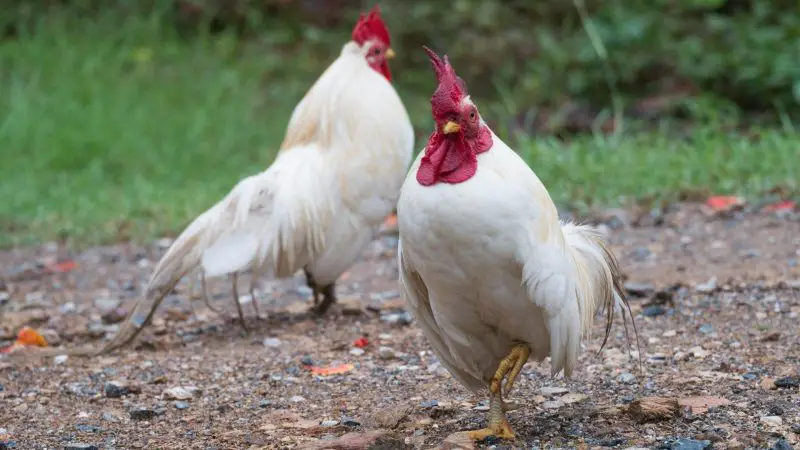
Leghorn chickens are some of the most prolific egg producers as they can lay between four and six eggs a week. However, it is important to note that Leghorn chickens are not known for their brooding or mothering capacity. So, their eggs are best used for consumption.
How Many Eggs Does an Ancona Chicken Lay?

Ancona chickens can lay four to five eggs a week and around 220 eggs a year. However, to maintain continuous and quality egg production, they need a high protein diet.
Ancona chickens will start producing eggs when they are as young as five months old.
How Many Eggs Does an Orpington Chicken Lay?
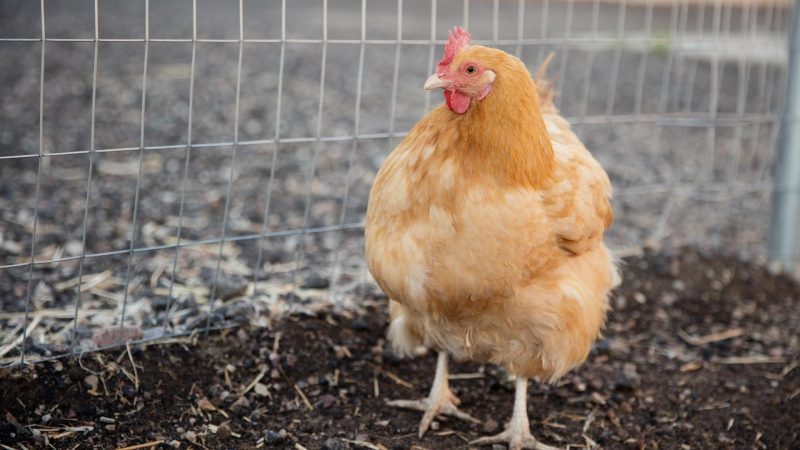
Orpington chickens lay three to five eggs a week and can lay up to 280 eggs a year. Additionally, they can produce eggs all year round, which makes them extremely popular.
Their eggs are brown and large. Orpington chickens can be bred for both meat and eggs.
How Many Eggs Does a Wyandotte Chicken Lay?
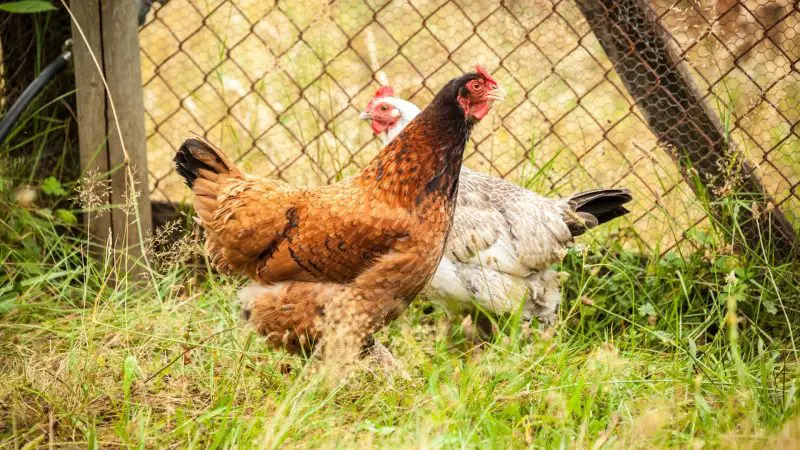
Wyandotte chickens can lay four to five eggs a week. They are considered excellent egg producers. Additionally, they generally continue to lay eggs even in the winter, making them highly sought after chickens.
Typically, their eggs are brown. Additionally, they can thrive in free-range and enclosed environments and still produce numerous healthy eggs.
How Many Eggs Does a Brahma Chicken Lay?
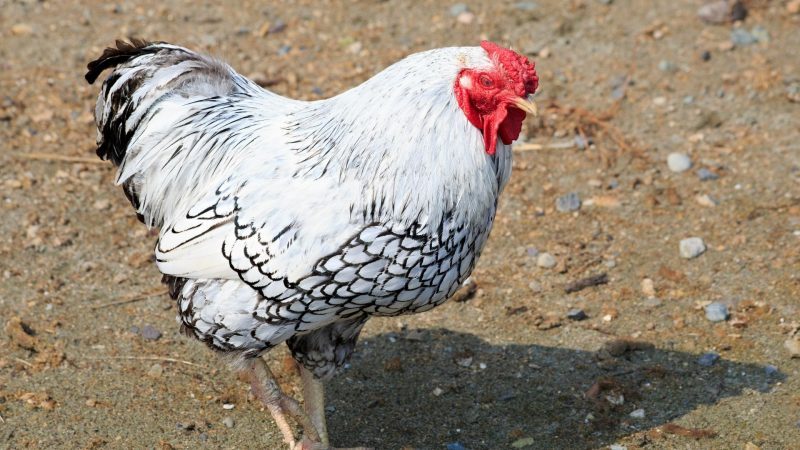
Brahma chickens are good egg producers and can lay up to three to four eggs a week. However, Brahma chickens take more time than other breeds to mature. Some Brahma chickens may only start producing eggs after they are two years old.
Because of this, Brahma chickens are more commonly bred for meat.
How Many Eggs Does a Bantam Chicken Lay?
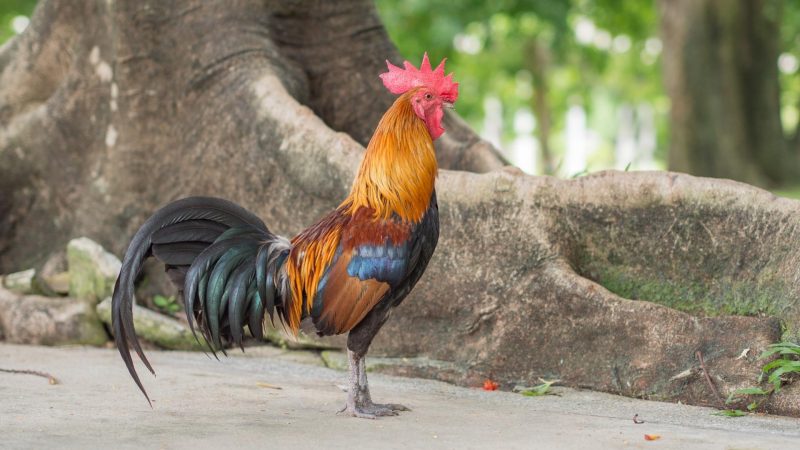
Bantam chickens are excellent egg producers and can lay three to four eggs a week in their prime. Their eggs are white or lightly tinted and smaller than many other chicken breeds.
However, as they are frequent egg producers, they make up for small quantities with significant production.
Factors Affecting the Egg Production
If you’re considering rearing a chicken to produce eggs, it is vital to think about the factors that affect egg production. Along with the chicken’s breed, other factors that may help or hinder egg production include the chicken’s environment, the season, and diet.
Here are other factors that affect egg production:
- Available light. Hens may lay more eggs when they have more access to light. On average, hens need 12-14 hours of light to be able to produce eggs.
- The time of year. Because they need light to produce eggs, hens may produce more eggs in the summer.
- Diet. To boost egg production, hens should have a diet rich in protein, minerals, vitamins, and access to freshwater. Supplements like crushed oyster shells may also support the production of large eggs.
- Available space. Chickens need enough space to lay their eggs and roost. A chicken will do well with three to five square feet (0.28-0.46 square meters) for each chicken.
